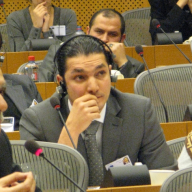 Kardo Bokani,
Kardo Bokani,
The Kurdish people in West Kurdistan (Syrian part) who had been organising themselves in local units since 2011 rose up on 19 July and took control of several Kurdish cities marking them as liberated zones. Although the organisation of Kurds in that part of Kurdistan can be traced back to the time when the Kurdish national leader Abdullah Ocalan dwelled there in early 1980s, their final preparation for the current uprising set out in parallel with what is known as the “Arab Spring” in Syria.
Notwithstanding, what puts the Kurdish uprising in a sharp contrast with its counterpart in Syria, is the nature of the occurrence. While the Syrian unrest has cost the lives of thousands, the Kurdish uprising has been promoted in a non-violent and democratic way.
The occupying powers of Kurdistan have always tried to portray the Kurdish resistances and liberation movements as violent lacking or not having any civil alternative in their agenda to secure their ends. No matter how strongly they have tried to embed this fiction in the minds of the Western observers, the current non-violent uprising of the Kurds in West Kurdistan substantiate the claim that Kurdish movements are democratic having preference for non-violent and civil methods as long as they are not faced with violence and bloodshed, in which case they have to hunker down to defend themselves.
Since the division of Kurdistan between the most aggressive states of the world— Turkey, Syria, Iraq and Iran— by Lausanne Treaty of 1923 the colonial grip of these rulers have been maintained through the application of violence, slaughter and hecatomb. To divert the orgy of violence by the colonialists the Kurds found themselves in a position of not having any option but to opt for defensive violence. Notwithstanding, the occupiers have not hesitated in regarding their own offensive, illegitimate and disproportionate violence as democratic means while branding the Kurds’ as the acts of “reactionaries”, “vagabond” and currently of “terrorism”.
A most cursory glance at the history of Kurdish national movements, will demonstrate that this was the colonial rulers who forced the Kurds to take up arms. The current uprising of the Kurds in West Kurdistan is the most conspicuous example of that fact that had the states not forced the Kurds into violent direction; the Kurds would have not taken up arms in demanding their national and human rights. The peaceful and non-violent uprising of Kurds in Syria manifests the democratic nature of Kurdish movements that has often been overlooked by the Western observers.
Having gravely frustrated by the breakthrough made by the Kurds in this country, Turkish Prime Minster has warned they would not tolerate such development. He even went further by threatening to invade north Syria to abort the process of what he sees as a nightmare—an independent Kurdistan. A raising question here is would Turkey venture such a step with unknown consequences for its already fatigued army which has suffered repetitively over the course of last year when the PKK (Kurdistan Workers Party) called off its unilateral ceasefire.
Having looked at the development made by the Kurdish national movements as well as the Kurdish society in general makes it an undoable task for Turkey to embark on such a perilous course of action. Neither Kurdish resistance movement, not the Kurdish society would permit such offensives. As the president of Kurdistan Communities Union (KCK) Murad Karayilan stated, the entire Kurdish society would rise up in rebellion had Turkey entered West Kurdistan. Mr. Karayilan is not making such a statement in hallow, the Kurdish society has left far beyond the era in which 5000 Kurds were gassed in Helebce town but no objection was made by the Kurds at the time.
The recent developments in the Kurdish resistance movements will also reflect the significant shift in the Kurdish society. Although Turkey has made serious efforts in splitting the Kurdish movements and pitting them against one another, they have well articulated their demands and merged together on a national line. Added to their amalgamated position, they have well organised the local people on the basis of direct democracy articulated by Abdullah Ocalan and have also established their own defence forces YPG (Units of Defence Forces) who are well prepared to fed off any attack.
As a conclusion, I would like to stress the nature of Kurdish national movements throughout their history of resistance against colonialism. The striking figure of Kurdish contemporary movement is its demand for a peaceful solution to the Kurdish issue. This claim is substantiated by the current development made by the Kurds in Syria; if the occupying states do not employ violent methods, the Kurds will not opt for it. Contrariwise; if the states embrace violence and bloodshed, the Kurds are well ready to defend themselves no matter who the attacker is going to be, either Syria or Turkey.
- Kardo Bokani is a PhD candidate in political philosophy. He can be reached at Kardo.bokani@gmail.com